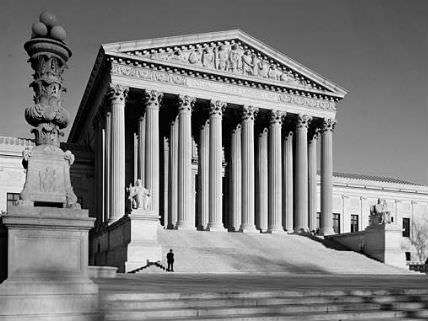SCOTUS Delivers Big Win for Criminal Defendant in 6th Amendment Case, Rejects Pre-Trial Freezing of Non-Tainted Assets
The Supreme Court issues a 5-3 opinion in Luis v. United States.

Today the U.S. Supreme Court delivered a significant victory both for property rights and for the 6th Amendment right to counsel in "all criminal prosecutions." By a vote of 5-3 in the case of Luis v. United States, the Supreme Court held that the federal government's efforts to freeze the non-tainted assets of a criminal defendant before trial violated that defendant's constitutional rights. "The defendant in this case," the Court observed, "has a Sixth Amendment right to use her own 'innocent' property to pay a reasonable fee for the assistance of counsel."
The dispute in Luis v. United States began in 2012 when Sila Luis was indicted in Florida on charges of defrauding Medicare of upwards of $40 million. The federal prosecutor in her case sought and obtained a pre-trial order freezing her assets. The reason this matter ended up before the Supreme Court is that the prosecutor sought to freeze not only her "tainted" assets, meaning those assets that can be arguably traced back to the alleged underlying crime, but the prosecutor also sought to freeze Luis' undisputedly legitimate assets, which amount to some $15 million that cannot be connected in any way to any alleged criminal activity.
Sila Luis has not been convicted of any crime connected to this matter and her case centered on why the Sixth Amendment protects her right to use her wholly legitimate assets to mount her legal defense. The federal government took the opposite position, maintaining that the Sixth Amendment should not stand in the prosecutor's path. In the government's view, because all of Luis' assets could potentially be subject to forfeiture if she is ultimately convicted, federal prosecutors should not be prevented from freezing all of her "forfeitable" assets before she goes on trial.
Today the Supreme Court vindicated Luis' rights and rejected the federal government's position. "The Government cannot, and does not, deny Luis' right to be represented by a qualified attorney whom she chooses and can afford," the Court said. "But the Government would undermine the value of that right by taking from Luis the ability to use the funds she needs to pay for her chosen attorney." The property at issue in this case, the Court noted, "is not loot, contraband, or otherwise 'tainted.' It belongs to the defendant." Furthermore, the Court noted, "to permit the Government to freeze Luis' untainted assets would unleash a principle of constitutional law that would have no obvious stopping place."
Today's 5-3 decision divided along unusual lines. Justice Stephen Breyer, joined by Chief Justice John Roberts and Justices Ruth Bader Ginsburg and Sonia Sotomayor, voted against the federal government and in favor of Sila Luis' 6th Amendment rights. Justice Clarence Thomas concurred in that judgment, though he wrote a separate opinion whose "reasoning rests strictly on the Sixth Amendment's text and common-law backdrop." Those five justices comprised the majority. Writing in dissent, Justice Anthony Kennedy sided with the government, joined by Justice Samuel Alito. Justice Elena Kagan filed an additional solo dissent of her own.
The Supreme Court's opinion in Luis v. United States is available here.


Show Comments (78)